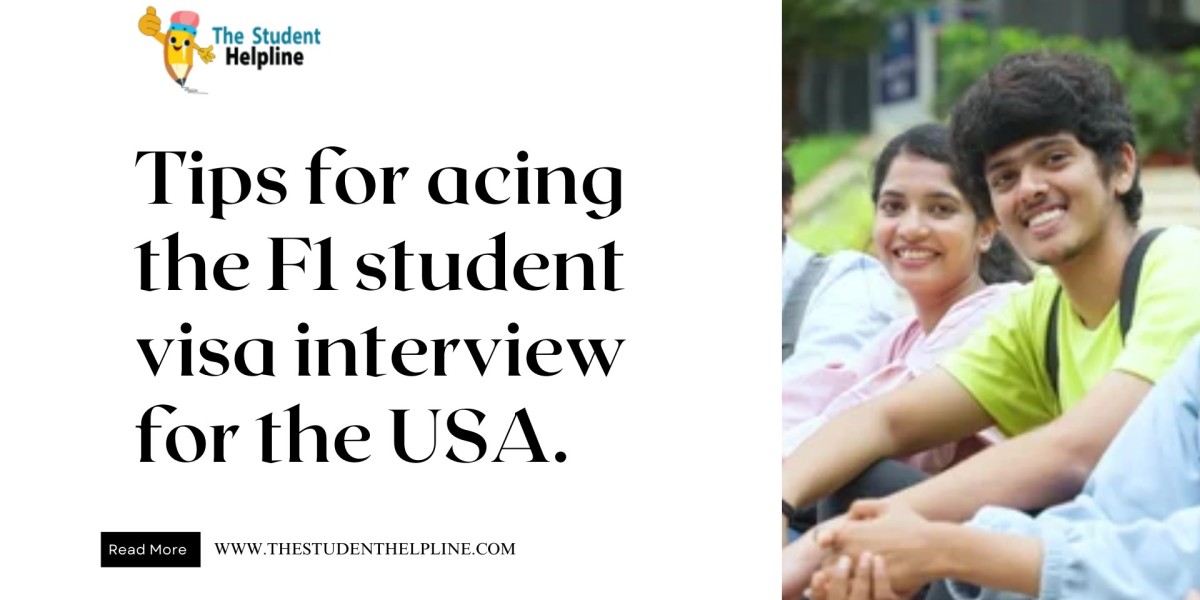The F1 visa interview is one of the most critical steps for students aspiring to study in the USA. This interview determines whether the U.S. government approves your intention to pursue higher education in the country. Preparing thoroughly and presenting yourself confidently can make a significant difference in achieving success. Here are some essential tips and insights to help you excel in your F1 visa interview.
1. Understand the Purpose of the F1 Visa Interview
The primary aim of the F1 visa interview is to assess your genuine intent to study in the USA. The visa officer evaluates:
- Your academic goals and reasons for choosing the USA.
- Financial stability to fund your education and living expenses.
- Intent to return to your home country after completing your studies.
2. Organize Your Documentation
Proper documentation supports your claims and reassures the visa officer. Make sure you have:
- I-20 Form: Issued by the U.S. institution where you’ve been accepted.
- Passport: Valid for at least six months beyond your intended stay.
- SEVIS Fee Receipt: Proof of payment for the Student and Exchange Visitor Information System (SEVIS) fee.
- Admission Letter: From the U.S. university.
- Financial Documents: Bank statements, scholarship letters, or sponsor details demonstrating your ability to afford tuition and living costs.
- Academic Records: Transcripts, degree certificates, and standardized test scores (TOEFL, GRE, SAT, etc.).
- Ties to Home Country: Evidence such as family business documents, property ownership, or job offers, showing your intention to return after graduation.
3. Research Your Program and University
Be prepared to explain why you chose to study in the USA, your specific university, and your program of study. Visa officers may ask:
- Why did you select this particular university?
- What makes this program unique?
- How does this degree align with your career goals?
Showcase your knowledge about the university's offerings, faculty, and facilities. This demonstrates your genuine interest and commitment.
4. Demonstrate Financial Stability
The U.S. government requires proof that you can afford your education and living expenses without engaging in unauthorized employment. You should:
- Be clear about your funding sources (family support, personal savings, scholarships, or loans).
- Explain how you plan to manage unexpected expenses.
- Provide authentic documents; any inconsistency can lead to rejection.
5. Be Honest and Confident
The visa officer is trained to spot inconsistencies or scripted answers. Be authentic when answering questions like:
- Why do you want to study in the USA?
- What are your plans after completing your degree?
Avoid memorizing answers. Instead, practice delivering honest and concise responses that reflect your genuine intent.
6. Prepare for Commonly Asked Questions
Below are some common F1 visa interview questions with tips on how to answer:
- Why did you choose to study in the USA instead of your home country?
Discuss the advanced education system, research opportunities, and global exposure. - What are your career plans after graduation?
Emphasize how the degree will help you contribute to your home country. - How will you fund your education?
Be specific about your financial resources and provide supporting documents. - Do you have any family in the USA?
Answer truthfully, as the officer may verify this information.
7. Practice Good Communication Skills
- Speak clearly and confidently.
- Maintain eye contact with the visa officer.
- Avoid using slang or overly complex language.
- Keep your answers concise, yet informative.
8. Dress Professionally
First impressions matter. Dress formally to convey respect and seriousness. Your attire should reflect professionalism, as if you were attending an important job interview.
9. Show Strong Ties to Your Home Country
Visa officers are keen to ensure you don’t have immigration intentions. Highlight your connections to your home country, such as:
- Family responsibilities.
- Career opportunities waiting for you.
- Property ownership or investments in your home country.
10. Be Prepared for Unexpected Questions
Sometimes, visa officers may ask unconventional questions to test your spontaneity. Examples include:
- What do you know about American culture?
- Why is your chosen field of study important to you?
- What will you do if your visa is rejected?
Stay calm, think before answering, and maintain a positive attitude.
11. Avoid Common Mistakes
- Incomplete Documentation: Ensure all required documents are complete and well-organized.
- Overconfidence or Nervousness: Striking the right balance between confidence and humility is essential.
- Misrepresentation of Facts: Always provide truthful and accurate information.
12. Familiarize Yourself with SEVIS and Visa Details
Understand the SEVIS process and your visa category. Be prepared to discuss your SEVIS ID, university details, and how the F1 visa fits into your plans for study in USA.
13. Arrive Early and Stay Positive
- Arrive at the embassy or consulate at least 30 minutes before your scheduled time.
- Be polite and respectful to everyone, including the staff.
- Keep a positive demeanor, regardless of the outcome.
14. Follow Up After the Interview
If your visa is approved, you’ll receive it within a few days. If it’s rejected, don’t lose hope. Identify the reasons for rejection, address them, and reapply with better preparation.
Final Thoughts
Acing the F1 visa interview requires preparation, clarity, and confidence. Remember, the interview is not just about answering questions—it’s about showcasing your genuine intent and capability to study in the USA. With thorough research, organized documentation, and a confident attitude, you can make a strong impression and move one step closer to your dream of studying in the USA.
Good luck!







